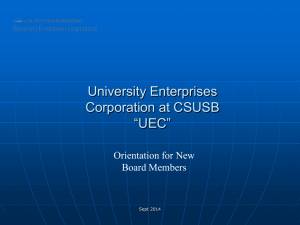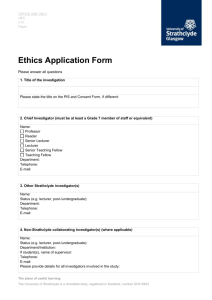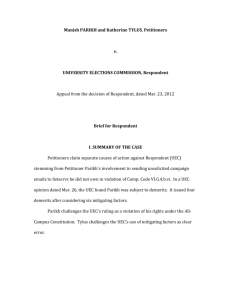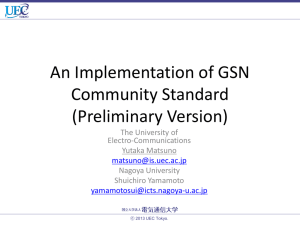W-15-002 (Diaz) - Central Student Government
advertisement
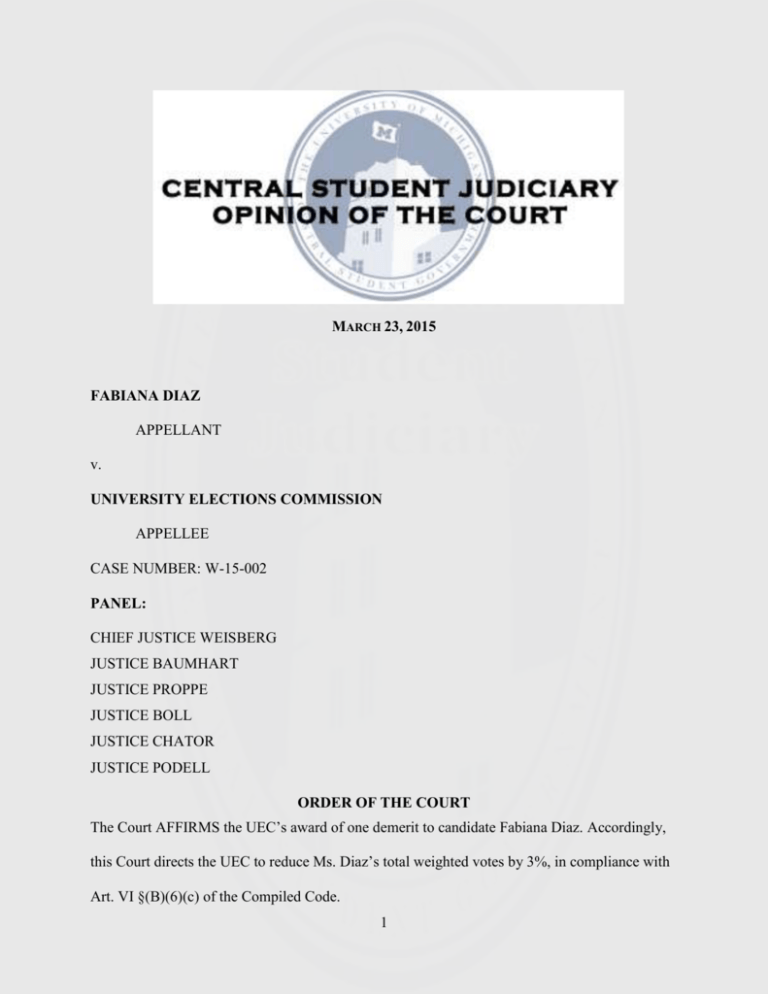
MARCH 23, 2015 FABIANA DIAZ APPELLANT v. UNIVERSITY ELECTIONS COMMISSION APPELLEE CASE NUMBER: W-15-002 PANEL: CHIEF JUSTICE WEISBERG JUSTICE BAUMHART JUSTICE PROPPE JUSTICE BOLL JUSTICE CHATOR JUSTICE PODELL ORDER OF THE COURT The Court AFFIRMS the UEC’s award of one demerit to candidate Fabiana Diaz. Accordingly, this Court directs the UEC to reduce Ms. Diaz’s total weighted votes by 3%, in compliance with Art. VI §(B)(6)(c) of the Compiled Code. 1 JUSTICE BAUMHART delivered the UNANIMOUS opinion of the Court, in which CHIEF JUSTICE WEISBERG, JUSTICE BOLL, JUSTICE CHATOR, JUSTICE PODELL, and JUSTICE PROPPE join. This case comes before us on appeal from a decision of the University Elections Commission (UEC). The Petitioner, Fabiana Diaz, challenges the UEC’s assessment of a onedemerit penalty against her for missing the UEC’s mandatory candidate meeting. For the reasons set forth herein, we affirm the UEC. I. On March 9, 2015, the UEC held its annual informational meeting for those students interested in standing as candidates in the University’s Central Student Government elections. This meeting was mandatory. Comp. Code, Art. VI, § B(2)(b) (“ . . . [T]he Election director shall hold a required meeting of all candidates . . . .” (emphasis added)). Several candidates were unable to attend this meeting for a variety of reasons. Among them was the Petitioner, who from March 4 until March 11 was traveling. This trip was arranged prior to her decision to run in the election, and thus prior to any notification of the date of the mandatory meeting. Upon her return, the UEC assessed the Petitioner a one-demerit penalty for her failure to attend the candidates’ meeting. Lin v. Campbell, UEC-W-15-001, at 2 (Univ. Elections Comm’n, March 17, 2015). Fourteen other candidates received the same penalty for the same reason, while seven candidates who missed the meeting received a warning because their absences resulted from “well-documented and compelling health concerns, academic commitments, and/or work commitments.” Id. at 2-3. The UEC acknowledged that the Petitioner submitted proof of her travel plans; the Commission reasoned, however, that it was “disinclined to allow absences due to pre-planned travel,” and that because the Petitioner 2 submitted her candidate form on February 27, 2015, she “knew or reasonably should have known of the candidate meeting March 9, 2015.” Id. at 2. This appeal followed. II. Some decisions of the UEC receive de novo review in this Court. See Comp. Code, Art. VI, §§ B(8)(c)(ii)–(iii) (requiring that decisions of the UEC departing from the demerit schedule elaborated elsewhere in the Code be reviewed de novo). For all other decisions of the UEC, including this one, the Court reviews for clear error. CSJ Manual of Procedure § 51.721; see also YouMich Party v. UEC, W-13-006, at 3 (CSJ, Apr. 12, 2013). Under this standard, the Court will not reverse a decision of the UEC unless it was “unquestionably erroneous.” Mandell v. UEC, F-11-02, at 4 (CSJ, Dec. 5, 2011) (citing Black’s Law Dictionary). III. It must be noted at the outset that a plain reading of the Compiled Code appears to vest the UEC with broad discretion in deciding how to assess penalties for violations of the Election Code. Article VI, §§ B(7)(d)–(f) set out a demerits schedule, with one to two demerits being assessed for a “minor infraction,” three to four for a “major infraction,” and “at least four” for an “egregious infraction.” The UEC is permitted to deviate downwards from this schedule, but it must “state its reasons” for doing so. Comp. Code, Art. VI, § B(8)(c)(ii). The UEC may also issue a warning in lieu of assessing demerits, but it must explain such a decision in writing. Comp. Code, Art. VI, § B(8)(c)(iii). These provisions thus establish a default rule that a candidate found guilty of an infraction will receive demerits; any departure from that baseline is a matter of grace on the part of the UEC. Against this backdrop, the Petitioner argues that the UEC’s decision to issue a demerit against her abused that discretion, resulting in clear error. The Petitioner concedes that the UEC had the authority to assign her the penalty that it did, but she nonetheless argues that the UEC 3 acted arbitrarily because last year it only warned those candidates who missed the mandatory candidates’ meeting, including those who were absent due to pre-arranged travel plans. See Keeney v. Dias, UEC-2014-W-005, at 1 (Univ. Elections Comm’n, March 13, 2014). As well, the issue was raised at oral argument whether the UEC had acted arbitrarily in its assessment of penalties among the candidates for this year’s election. A. We reject the Petitioner’s assertion that prior decisions of the UEC assessing penalties for infractions are binding on that body in subsequent decisions. The Petitioner could point to no provision of the Compiled Code that would support such a requirement, and this Court has likewise found none. Moreover, such a restrictive rule is at odds with the apparent discretion vested in the UEC through the Compiled Code to issue these penalties. This discretion allows the UEC to address these infractions on a case-by-case basis and provide the response it deems to be most fitting, taking into account all of the relevant circumstances. Such benefits should not lightly be cast aside, and in the absence of an explicit textual command we can find no compelling reason to do so. Even though the UEC’s decisions lack binding force, the Petitioner suggests that the UEC’s deviation from its prior decision causes notice problems for candidates such as her. As an initial matter, we note that the Petitioner came forward with no evidence of actual reliance on the prior decision when making her plans. Indeed, the Petitioner stated that she had already made these travel plans by the time she was notified of the candidates’ meeting, and that it would have been too costly to change those plans at that point. Having been thrust into a situation that she could not change even if she desired to, it is unclear how the Petitioner could have relied to her detriment on that prior decision. But no matter—even if she did rely on it, that reliance was unreasonable in the face of the unambiguous language regarding the demerit schedule found in 4 the Election Code. Missing the mandatory candidates’ meeting is classified as a “minor infraction” and is punishable by one or two demerits. Comp. Code, Art. VI, § B(7)(d)(iv). The Code further states that demerits “shall be assessed based on their classification” as applying to minor, major, or egregious infractions. Comp. Code, Art. VI, § B(8)(c)(i). If it so chooses, the UEC “may issue demerits below the guidelines,” Comp. Code, Art. VI, § B(8)(c)(ii), or it “may” warn a candidate rather than assigning demerits. Comp. Code, Art. VI, § B(8)(c)(iii). There is no plausible argument that these provisions create anything approaching a right or any sort of entitlement to receive a warning rather than a demerit. The fact that the UEC once granted leniency does not obligate it to do so again. Moreover, the UEC provided a credible reason for the different outcomes. Last year, the candidates’ meeting was scheduled for February 27—the Friday before the University’s spring break. The UEC decided that, in view of what it perceived to be the extraordinary number of students who leave campus early on vacation, it would accommodate that practice and issue only warnings to absent candidates. This year, the UEC sought to avoid that problem by scheduling the candidates’ meeting after spring break, when far fewer students are absent from campus on vacations. On this understanding, accommodation of travel plans was significantly less imperative. One may disagree with the UEC’s assessment, but we cannot say that it was unreasonable under the circumstances. B. Having found that the UEC’s change of tack in penalizing absences due to pre-arranged travel plans does not constitute clear error, we turn now to the issue of whether, in light of the other penalties handed out to absent candidates this year, the UEC’s assessment of a one-demerit penalty against the Petitioner is clearly erroneous. We hold that it is not. 5 The UEC’s decision in this matter articulates that the only candidates who received a warning for their absences were those with “well-documented and compelling health concerns, academic commitments, and/or work commitments.” Campbell, supra, at 2. The apparent consequence of this rule is that any candidate who missed the meeting for a reason that was not well-documented, compelling, or related to health, academic commitments, or work commitments would receive demerits instead of a warning. The Petitioner’s case falls squarely within that rule—though she provided documentation of her trip (a booking confirmation and trip itinerary), her excuse, even if compelling, was not a health concern, academic commitment, or work commitment. Thus, it appears that the UEC applied its guiding rule to her consistently with the other absent candidates. It was noted at oral argument that another absent candidate was assigned a demerit because the UEC only issued “warnings to candidates with well-documented reasons for missing the candidates’ meeting.” Id. Admittedly, a plausible reading of this justification is that, had the candidate provided documentation, she would have received a warning instead of a demerit. Such an outcome would be inconsistent with the UEC’s guiding rule, which also required that the absence be for a compelling reason and one related to health, academics, or work. If this were the only available reading, it would raise the thorny question of whether the Petitioner would have standing to challenge an allegedly inconsistent application of the UEC’s guiding rule to another candidate. Happily, we need not answer that question, because the UEC’s justification admits of another reading, consistent with its rule. That particular candidate’s excuse was that she was in a traffic accident on the way to the meeting from work in Detroit. Thus, her reason was related to a work commitment. Moreover, the UEC expressed sympathy for this candidate’s plight, calling it “unfortunate.” Id. It is reasonable to infer that such sympathy is consistent with the UEC finding this reason compelling. As a consequence, the only 6 element missing was documentation, which explains the UEC’s limitation of its justification to that factor alone. In light of the plausibility of this reading, and the considerable deference mandated by the clear error standard, we find that the UEC’s decision to assign the Petitioner one demerit for her failure to attend the candidates’ meeting despite her pre-arranged travel plans was not clearly erroneous. We therefore affirm the UEC. It is so ordered. CHIEF JUSTICE WEISBERG, whom JUSTICE PODELL and JUSTICE LIPNIK join, concurring. Although I agree with the holding, arguments, and analysis presented in the Court’s opinion, I write separately today to call attention to the issues posed by the UEC’s inconsistent attention to detail when writing its opinions. This problem is highlighted by – but by no means confined to – the Lin v. Campbell opinion, and if not corrected may decide the outcome of future UEC cases appealed to our Court. Given that the UEC’s makeup changes from year and its membership is not exclusively comprised of the University’s law students, see Compiled Code Art. VI §(F)(2)(a) (“The UEC shall be composed of at least five enrolled students, including at least one member from the University Council.”), it is expected that the UEC’s writing style and method of analysis will vary from year to year, and from opinion to opinion. When the UEC’s analysis is insufficiently detailed, however, it impairs CSJ’s ability to review the UEC’s findings. Although the Court reviews some of its cases de novo, in demerits cases like this one our Court reviews for abuse of discretion that results in “clear error.” CSJ Manual of Procedure § 51.721. Because CSJ is acting in an appellate capacity when it reviews UEC cases, its members 7 are not privy to the UEC’s in-person discussion when deciding how it rules on a case. In fact, it would be improper for CSJ justices to participate in or watch a UEC hearing, as this could compromise our ability to impartially hear an appeal in the matter. When this Court reviews a UEC decision, that body’s opinion is often the only insight we have into its decision-making process. If the UEC’s opinion does not clearly convey (a) the evidence it considered, (b) its logical decision-making process leading to findings of fact, and (c) an express, consistentlyapplied rationale for imposing penalties on a party (or for imposing different sanctions on different parties), our Court cannot properly decide whether or not the UEC committed an abuse of discretion that results in “clear error.” Whether or not the UEC member writing the opinion is a law student, sufficiently addressing these three criteria should not be particularly difficult. In cases such as this one, which involve many defendants, it is imperative to the promotion of justice that all parties are sentenced according to the same express standard. In Campbell, the UEC appears to announce such a standard, that candidates with “well-documented and compelling health concerns, academic commitments, and/or work commitments” will receive warnings instead of demerits for missing the candidates’ meeting. Campbell at 2. However, the UEC does not seem to have consistently applied its “well-documented health, academics, or work” standard, as defendant SERENA JONES was apparently penalized because she took too long to explain her absence to the Election Director and failed to provide documentation proving that she missed the candidates’ meeting because she was in a car accident. Campbell at 2 (“Because we did not receive any such documentation from her other than a compelling explanation for her absence, and because she did not contact the Election Director until four days after the meeting to explain her absence, we are inclined to issue a demerit.”). 8 If defendant Jones was penalized for tardiness of reporting and lack of documentation about the accident, as the UEC’s opinion seems to suggest she was, then the UEC clearly deviated from its “well-documented health, academics, or work” standard. If the UEC had been consistently applying the standard, it would have quickly dismissed JONES’s claims by pointing out that an injury-free car accident is not a “health concern,” an “academic commitment,” or a “work commitment.” If the UEC imposed demerits on defendant JONES according to a metric other than its announced “well-documented health, academics, or work” standard, it becomes possible that the UEC abused its discretion to the point of “clear error.” Moreover, if the UEC failed to apply its announced standard when assessing demerits against defendant JONES, it is also possible that the UEC failed to apply its announced standard – and therefore abused its discretion to the point of “clear error” – when assessing demerits against defendant DIAZ. I agree to affirm the UEC’s ruling, however, because its analysis of defendant JONES does not explicitly demonstrate that it abandoned its “well-documented health, academics, or work” standard. The UEC’s opinion notes that defendant JONES “lives and works in Detroit,” Campbell at 2, making it possible that, due to testimony presented at the UEC hearing but not included in the Campbell opinion, JONES’s accident counted as a “work commitment” and leniency was only refused because she failed the “well-documented” part of the test. The Court’s gymnastic ability to read a UEC opinion in a manner that makes it consistent, and therefore salvageable, is a slender reed upon which to assume that the UEC consistently applied a standard of its own creation. For now, however, the reed remains unbroken. Justice Baumhart correctly points out that the Election Code imposes demerits as a default, and the UEC gives warnings at its “grace.” However, “grace” does not imply “caprice.” When some defendants receive leniency according to a standard that is not applied to all of them, this invites allegations of favoritism that undermine the public’s perception of judicial 9 independence and it also likely infringes defendants’ Due Process rights under Art. VIII §8 of the All Campus Constitution. The solution moving forward is simple: the UEC, as it has almost always done, needs to articulate a clear standard upon which leniency will be granted. Given that UEC precedent is non-binding, each year’s leniency standard is sui generis and candidates cannot reasonably rely on previous years’ standards as more than persuasive authority. However, in exchange for all of this discretion, the UEC must guarantee minimal Due Process by consistently and clearly applying the standard it chooses to the facts of each defendant’s case. By clearly applying the same standard to all similarly-charged defendants within the same opinion, and presumably within the same election cycle, a few extra words from the UEC will resolve a lot of potential problems moving forward. Accordingly, I also would affirm the judgment of the UEC for these reasons, as well as the reasons so well stated by Justice Baumhart. 10
